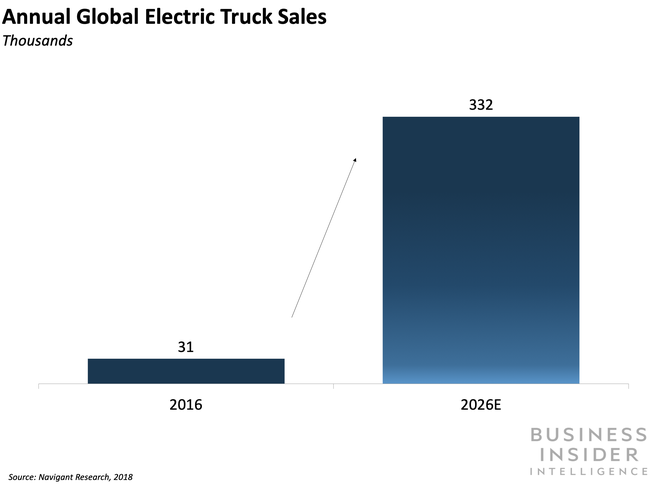DHL will debut a fully electric delivery van in the US next year
This story was delivered to Business Insider Intelligence Transportation & Logistics Briefing subscribers earlier this morning.
German logistics company DHL will debut a fully electric delivery van in the US next year through its electric vehicle (EV) subsidiary StreetScooter, according to Reuters. The company plans to bring its Work L vans to two markets, one on each coast, starting in the spring.

Following those limited deployments, StreetScooter's Work L van could see full deployment by 2022 or 2023. For DHL, this expansion is part of a broader strategy for using EVs to not only adhere to new and future emissions regulations, but also turn the electrification of transportation into a revenue driver.
For context, cities around the world — including Los Angeles, London, and Tokyo — have goals of establishing zero-emission areas by 2030. This would limit the ability of logistics companies that continue to use internal combustion engine vehicles to operate in these highly populous cities. DHL's strategy came into focus in 2014 when it acquired StreetScooter to electrify its own fleet — enabling it to cut costs and meet emissions regulations. The company hopes to attract customers who will also have issues with zero emission zones and meeting new regulation, turning the subsidiary into a revenue driver.
DHL isn't an outlier in its electric mobility efforts, as logistics giants across the globe enact their own strategies to reduce emissions and costs — we expect this trend will continue as more regulation and pressure is put on companies to reduce their carbon footprint.
UPS: The US-based logistics firm claims to have invested over $1 billion in building out its alternative fuel transportation capabilities. Through these investments, UPS hopes to address concerns over climate change and emissions, while also addressing a major operational cost — UPS spends well over $2 billion on fuel per quarter. By 2020, UPS wants 1 in 4 new vehicles purchased to rely on alternative energy sources.
FedEx: As of April 2019, FedEx had 2,554 EVs in its fleet, steering the company toward its goal of reducing carbon emissions 30% by 2020.
Amazon: In September, the e-commerce company placed an order for 100,000 electric delivery vans from EV startup Rivian. The vans are expected to be on public roads by 2024, with the first coming as soon as 2021. This order came after Amazon led a $700 million investment round for Rivian, which could point to the two companies having a broader relationship as the e-commerce giant builds up a large electric fleet.
Want to read more stories like this one? Here's how to get access:
Join thousands of top companies worldwide who trust Business Insider Intelligence for their competitive research needs. >> Inquire About Our Enterprise Memberships
Explore related topics in more depth. >> Visit Our Report Store
Current subscribers can log in to read the briefing here.
Read the original article on Business Insider

